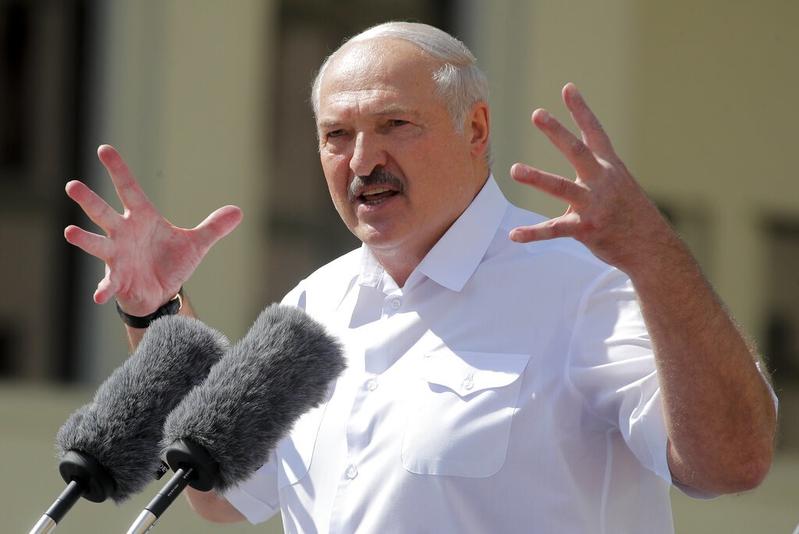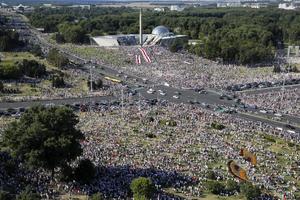 Belarusian President Alexander Lukashenko addresses his supporters gathered at Independent Square of Minsk, Belarus, Aug 16, 2020. (DMITRI LOVETSKY / AP)
Belarusian President Alexander Lukashenko addresses his supporters gathered at Independent Square of Minsk, Belarus, Aug 16, 2020. (DMITRI LOVETSKY / AP)
MINSK/MOSCOW/BRUSSELS - Alexander Lukashenko, the leader of Belarus, said on Monday he would be ready to hold new elections and hand over power after a constitutional referendum, an attempt to pacify mass protests and strikes that pose the biggest challenge yet to his rule.
He made the offer, which he insisted would not be delivered on while he was under pressure from protesters, after exiled opposition politician Sviatlana Tsikhanouskaya said she was willing to lead the country.
In a sign of Lukashenko’s growing vulnerability, he faced heckling and chants of “step down” during a speech to workers at one of the large state-run industrial plants that are the pride of his Soviet-style economic model and core support base.
Russia has told Lukashenko it is ready to provide military help to Belarus in the event of an external threat. Russia is watching closely as Belarus hosts pipelines that carry Russian energy exports to the West and is viewed by Moscow as a buffer zone against NATO. Lukashenko and Russian President Vladimir Putin spoke twice this weekend.
Lukashenko faces the threat of European Union sanctions after a bloody crackdown on protests following what demonstrators say was his rigged re-election victory last week. He denies losing, citing official results that gave him just over 80 percent of the vote.
We’ll put the changes to a referendum, and I’ll hand over my constitutional powers. But not under pressure or because of the street.
Alexander Lukashenko, Belarusian president
ALSO READ: Belarusian president Lukashenko re-elected by landslide
He offered to change the constitution, an apparent concession that seems unlikely to satisfy protesters.
“We’ll put the changes to a referendum, and I’ll hand over my constitutional powers. But not under pressure or because of the street,” Lukashenko said, in remarks quoted by the official Belta news agency.
“Yes, I’m not a saint. You know my harsh side. I’m not eternal. But if you drag down the first president you’ll drag down neighbouring countries and all the rest.”
He also said people could hold parliamentary and presidential elections after the referendum if that was what they wanted.
Speaking in a video address from Lithuania, opposition politician Tsikhanouskaya urged security and law enforcement officers to switch sides, saying they would be forgiven if they did so now.
“I am ready to take responsibility and act as a national leader during this period,” Tsikhanouskaya said.
She called for the creation of a legal mechanism to ensure that a new fair presidential election could be held.
Thousands of protesters marched in the capital Minsk on Monday morning to the state-run Minsk Automobile Plant (MAZ), where Lukashenko flew by helicopter to speak to striking workers. He got a rough reception.
“Thanks, I’ve said everything. You can (continue to) shout ‘step down,’” he said, struggling to be heard.
He then walked away as the crowd chanted “Step down”.
Media outlet Tut.By showed footage of Lukashenko confronting one worker, saying “I will not beat you up” before adding “if somebody provokes something here, we will sort it out in a hard way. So, man up.”
Lukashenko played down the impact of the strikes, saying "those who want to work, let them work. They do not want to work, well, we will not force them," according to comments released by Belta.
Strike action hit Belaruskali, one of the world’s largest potash producers, partly shutting production, Russia’s TASS news agency cited a local trade union as saying. The state-owned firm, a key source of dollar revenue for Belarus, said its plant was still working.
The strikes came a day after Belarusians chanting "Step down!" filled the centre of Minsk on Sunday in the biggest protest so far against what they said was the fraudulent re-election a week ago of Lukashenko.
 People with old Belarusian national flags shout during opposition rally in front of the government building of Minsk, Belarus, Aug 16, 2020. (SERGEI GRITS / AP)
People with old Belarusian national flags shout during opposition rally in front of the government building of Minsk, Belarus, Aug 16, 2020. (SERGEI GRITS / AP)
There was no visible police presence at the protest, which attracted around 200,000 people, a Reuters reporter estimated. At least two protesters have died and thousands have been detained in a crackdown since the vote.
READ MORE: Belarus president says Putin ready to help ensure security
The Kremlin said Russian President Vladimir Putin had told Lukashenko Moscow was ready to assist Belarus in accordance with a collective military pact if necessary and that external pressure was being applied to the country. It did not say where from.
Lukashenko, who has alleged a foreign-backed plot to topple him, said NATO tanks and planes had been deployed 15 minutes from the Belarusian border. NATO said it was closely monitoring the situation in Belarus, but that there was no military build-up at the country's western border.
The Belarusian army will hold drills in the west of the country from Aug 17-20, Russia's RIA news agency reported.
READ MORE: Russia says outside forces trying to destabilise Belarus
 Belarusian opposition supporters rally in the center of Minsk, Belarus, Aug 16, 2020. (DMITRI LOVETSKY / AP)
Belarusian opposition supporters rally in the center of Minsk, Belarus, Aug 16, 2020. (DMITRI LOVETSKY / AP)
The Belarus Interior Ministry said there were no arrests at the rallies, although local media reported a few people had been detained.
READ MORE: Belarus eases security in Minsk after poll protests
The first leader of independent Belarus who helped oversee the Soviet breakup told Reuters Lukashenko, a one-time manager of a Soviet-era collective farm, had been badly shaken but could still hang onto power with Kremlin backing.
Stanislav Shushkevich, 85, an old opponent of Lukashenko, dismissed the idea of Russia sending in troops to prop Lukashenko up, saying he had a large, obedient army and well paid loyalists around him.
The Czech prime minister urged his counterparts in the European Union (EU) to help, recalling the crushing of Czech protests by a military invasion led by Moscow in 1968 as well as the peaceful overthrow of communism in 1989.
"Belarus must not experience what we had in 1968," Andrej Babis tweeted. "(The) EU must be active, support Belarusians (and) not to be afraid to stage a similar velvet revolution model (as in) 1989."
The EU is gearing up to impose new sanctions on Belarus in response to the crackdown.
EU leaders will hold a video call on developments in Belarus at 1000 GMT on Wednesday, said their chairman, European Council President Charles Michel.


